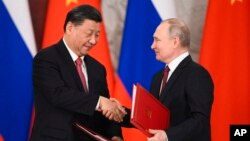A declassified report from the Office of the Director of National Intelligence released Thursday says that support from China is "critical" to Russia's ability to continue waging its war against Ukraine.
The report, which was requested by Congress, assesses how a range of actors, including the Chinese government, the Chinese Communist Party, state-owned Chinese companies and other Chinese entities, are supporting Russia's economy and its military, nearly 18 months after the Kremlin's unprovoked attack on Ukraine.
"Beijing is pursuing a variety of economic support mechanisms for Russia that mitigate both the impact of Western sanctions and export controls," the report finds.
"The PRC [People’s Republic of China] has increased its importation of Russian energy exports, including oil and gas supplies rerouted from Europe. Beijing has also significantly increased the use of its currency, the yuan, and its financial infrastructure in commercial interactions with Russia, allowing Russian entities to conduct financial transactions unfettered of Western interdiction."
The report also finds that China has been directly supporting the Russian war effort by selling technology and "dual use" equipment — meaning items that may have both civilian and military uses — to Moscow.
Enabling a 'brutal invasion'
The report was released by the House Permanent Select Committee on Intelligence.
Representative Jim Himes, the most senior Democrat on the committee, said, "This unclassified assessment, mandated by last year's Intelligence Authorization Act, details the extent of China's support for [Russian President Vladimir] Putin's ongoing invasion.
"Russia's war against Ukraine has been enabled in no small part by China's willingness to support them, in direct and indirect ways. I hope this report makes clear to Beijing that the United States, and the world, will know if they take further actions to enable Putin's brutal invasion."
Representative Mike Turner, the committee's Republican chairman, had not issued a statement about the report as of Friday afternoon.
China responds
Chinese Foreign Ministry spokesperson Mao Ning commented on the report in her daily news briefing Friday, saying there was nothing out of the ordinary involved in her country's trade with Russia, while decrying Western sanctions on Moscow.
"China is engaged in normal economic and trade cooperation with Russia and other countries on the basis of equality and mutual benefit," Mao said. "We oppose unilateral sanctions and long-arm jurisdiction that have no basis in international law or mandate from the Security Council. China-Russia cooperation does not target any third party and shall be free from disruption or coercion by any third party."
China and Russia have significantly deepened their relationship in recent years. In the days prior to the launch of the full-scale invasion in February 2022, Chinese President Xi Jinping and Putin announced that their countries' partnership had "no limits."
Oil and gas
In the wake of the invasion, a united front of nations led by the United States applied an extraordinary web of sanctions, severing the flow of goods and services between Russia and most major Western markets.
The report finds that since the invasion, trade with China has replaced much of that lost commerce. In 2022, bilateral trade between Russia and China hit a record high, with Russian imports from China rising by 14% and exports to China jumping by 43%.
Much of Russia's exports to China came in the form of oil and gas products that Moscow previously sold to the West. China's purchase of the petroleum products has been a valuable source of income for the Kremlin, and steep discounts on Russian fuel have been a boon to China.
China is providing supertankers to move Russian oil to market as well as the insurance coverage that shipping companies demand, after sanctions cut Russia off from the global maritime insurance market.
Semiconductor trade
One of the West's major efforts against Russia has involved cutting the country off from a reliable supply of semiconductors needed for many modern devices, including military vehicles and weapons systems.
The report notes the appearance of a web of newly formed businesses in Hong Kong, which it characterizes as "shell companies" that are being used to purchase semiconductors on the open market and then resell them to Russia in violation of U.S. export control rules.
China is supplying both dual use goods and some explicitly military material to Russia, the report says.
"[C]ustoms records show PRC state-owned defense companies shipping navigation equipment, jamming technology and fighter-jet parts to sanctioned Russian government-owned defense companies," the report reads. "Russia has continued to acquire chips through circuitous routes, with a large portion flowing through small traders in Hong Kong and mainland PRC, according to foreign press."
After Russian banks were largely cut off from systems that allow cross-border payments, many began to rely on Chinese banks to facilitate trade between the two countries and between Russian companies and firms in third countries that are not participating in Western sanctions.
Russia has also been accepting payments and purchasing goods using China's currency, the yuan. By August 2022, six months after the beginning of the invasion, Russia's use of the yuan in offshore payments had increased by a factor of 10.
Open source
Ian Johnson, a senior fellow for China studies at the Council on Foreign Relations, told VOA that even though much of the material in the report was drawn from sources that were already public, its assembly in one place makes the scope of Beijing's support for Moscow clearer.
"I don't think it's new, but it reinforces and systematically explains what many people have felt: that China is trying to help Russia as much as possible without getting in big trouble regarding sanctions," Johnson said.
"They're trying to push the envelope as much as possible, and anything they can do — by sopping up extra energy that Russia hasn't been able to unload, letting them use the yuan — makes it a little bit easier for Russia," he said. "All these things are also in China's interest. It's not entirely altruistic. They have many reasons for wanting to keep Russia afloat."




